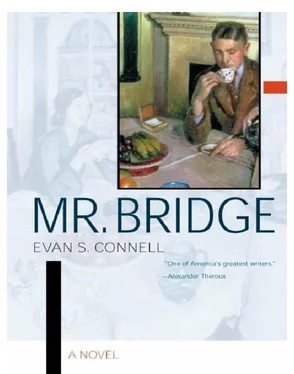“ ‘Good luck who wait.’ ” he read aloud. “This must be a misprint. I suppose it means ‘Good luck to those who wait.’ ”
Ruth snapped her fortune cookie apart and straightened the crumpled paper. “ ‘Your new affairs will turn out well,’ ” she read, and laughed.
Both of them turned to Mrs. Bridge, who looked at them blankly. There was no fortune cookie on her plate. She had eaten it.
“Mother,” said Ruth with an incredulous expression, “did you eat the paper?”
With as much dignity as possible she said, “I thought there was something odd inside.”
After a long silence Mr. Bridge said, “Do you mean to tell me you never saw a fortune cookie before?”
She smiled stiffly.
“Well,” he said, “I’m not sure just what we do now. Would you like another?”
“No, thank you, I don’t believe so,” she replied, and she touched her pearl necklace as if it were a talisman which would protect her from everything strange.
In the days that followed this remarkable incident he found that it affected his feelings toward her, reawakening his desire to guard and shelter her. He had nearly forgotten her extraordinary naivete because he had grown accustomed to it. He began to remember astonishing remarks she made in pure faith, and attitudes which touched him deeply because they were born of genuine innocence. She had never smoked a cigarette, and never had he heard her use a vulgar expression. She believed that women should refrain from saying or doing anything coarse, just as she believed most people to be generous, well intentioned, and trustworthy. He wondered again, as he used to wonder when they were first married, how she had managed to live this much of her life with such simplicity, unaware of treachery, suspicion, malice, guile, and so many other means whereby life is lived; and he realized more clearly how he himself was responsible. He had taken her from the home where she had been sheltered as a child and substituted himself for her father, so she knew nothing she had not been permitted to know. Now she must refuse to believe everything which contradicted her beliefs. As long as she lived she would be like this.
While she wandered around the deck of the ship studying the ocean and chatting with other tourists, he observed her with a sense of amazement. She was forty-seven years old and this was the first time she had seen an ocean. Of course it was natural, because they lived so far from the ocean, yet he could not get over his amazement. Once he had taken her to Chicago; there she saw Lake Michigan and was greatly impressed. In forty-seven years she had seen Lake Michigan and had viewed the Rocky Mountains a few miles west of Denver, otherwise she knew of nothing larger than Lake Lotawana. Several times she had mentioned how much she would like to see the Grand Canyon.
He often thought about this; it saddened him and filled him with grave wonderment, and caused him to feel obscurely guilty. Perhaps they should not have waited so long to take this trip. They could have visited Europe sooner, seen and done many things. Now it was almost too late. She was passing through life with a neutral and pleasant expression, utterly failing to recognize the world in which she lived: a desperate, harsh, remorseless world where everybody knew there was a piece of paper inside a Chinese fortune cookie. This was more than merely odd. It was more than strange. It was a bit grotesque. Perhaps they should have gambled at Las Vegas and flown to India. There were sights and sounds and experiences far beyond the limits of Kansas City which perhaps they should have shared before this.
And yet there had been so much to do at home. She had been busy with the children. He had been occupied with his career. They had lived reasonably and logically, with fine practicality, and it had come to this. Over halfway through life, possibly much closer to the end than they knew, this was where they found themselves.
Three days before they expected to reach England the ship began to roll as though some immense weight in the hull was sliding from side to side: water sloshed across the portholes, pencils rolled off tables, passengers grabbed for support when they tried to walk, closets creaked, the staterooms grew dark and then light again and dark, the sky was brindled gray, canvas chairs on the promenade deck flapped emptily, and not many people came to lunch. Mr. Bridge, though, had never felt better and was on his feet at the first note of the steward’s gong; and after a big meal he strode around the decks and climbed the ladders and stood with his nose pointing into the wind while he appreciatively sniffed the icy spray. The previous days at sea had been all right, he had enjoyed them too, but this was more to his liking.
The weather got worse. The ship plunged like a wild horse, foam spewed across the bow and crossed the decks with a rushing, spattering hiss, water trickled inside the portholes, bottles and vases fell over, and Mr. Bridge decided he was feeling thirty years younger. He thought it might be fun to play shuffleboard, so he descended to the cabin where he had left his wife with a copy of Reader’s Digest . Now she lay on her bunk. A washcloth was spread over her face and a bottle of medicine stood on the table. He regarded her with silent disapproval and climbed back up to the lounge — steering himself along the tilting corridor with an amused expression — lunged like a fencer at the door, managed to get inside without cracking his head, and looked about hopefully for a shuffleboard opponent. But in the lounge there were just five passengers, every one of them more dead than alive, staring at nothing as though they were made of wax.
And the weather got worse. Several members of the crew entered the lounge and strung ropes from pillar to pillar. The ship heaved and rolled and buried itself in the waves as though it intended to dive for treasure. The horizon sank dizzily. The deck shuddered. The passengers sagged in their chairs as if their bones were pudding. Mr. Bridge observed them with disgust. He found the motion of the ship invigorating.
At the first note of the supper chimes he hurried down to the cabin once more. Possibly by now she had recovered. But when he inquired if she was ready to eat she feebly turned her head to the wall. He asked if he could bring her anything. A bowl of soup? — an orange? — a slice of cake? She did not respond. He climbed the ladder again, whistling. He had not whistled for many years.
He marched into the dining salon rubbing his hands with anticipation. He sat down alone at the table, which seated eight, and without hesitation he devoured everything the steward put in front of him.
One rainy morning before dawn they landed at Southampton and in sleepy silence rode through the orderly English countryside toward London. Somewhere along the way a middle-aged Englishman wearing a sweater and a tweed jacket stepped into the compartment, seated himself, and began to read a newspaper. Mr. Bridge was dozing when the door opened and he caught only a glimpse of the man before he disappeared behind the newspaper, yet in that instant he saw something which disturbed him, and he waited for a better look. At last the Englishman folded the paper, then Mr. Bridge saw his face. The face was that of his grandfather.
Later in the day at their hotel in London while she was unpacking the suitcases he studied the timetable of the Southampton train. He was certain he would never again see this man, who had vanished in the crowd at the station as mysteriously as he appeared, and he had no intention of trying to locate him, but he wanted to know the name of the town where the Englishman got aboard the train. So he shut his eyes, trying to recall the announcement of the stop; then she asked if he had a headache. No, he said, and put away the timetable.
Читать дальше












